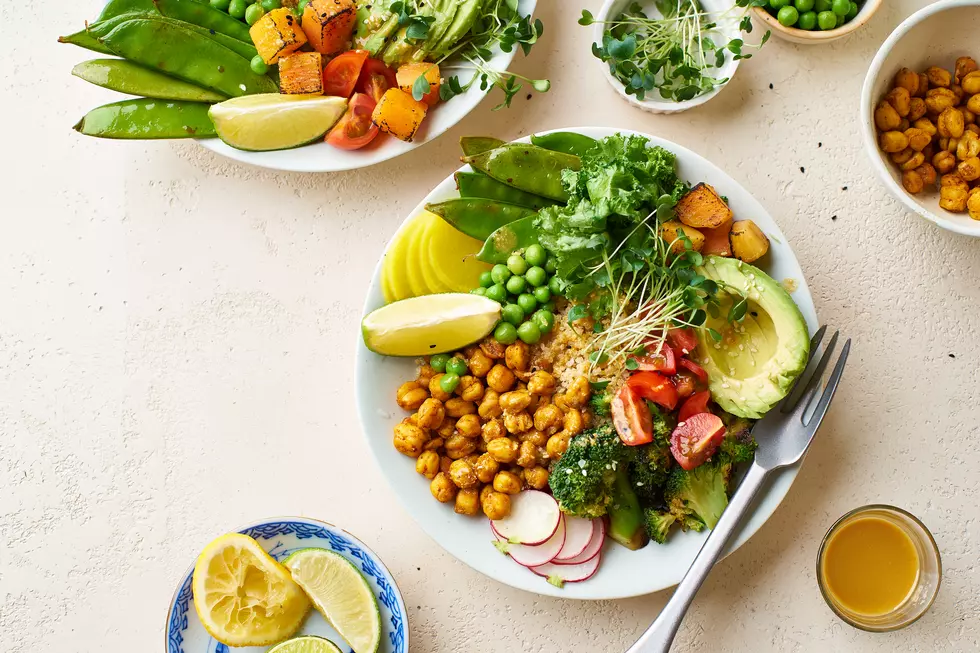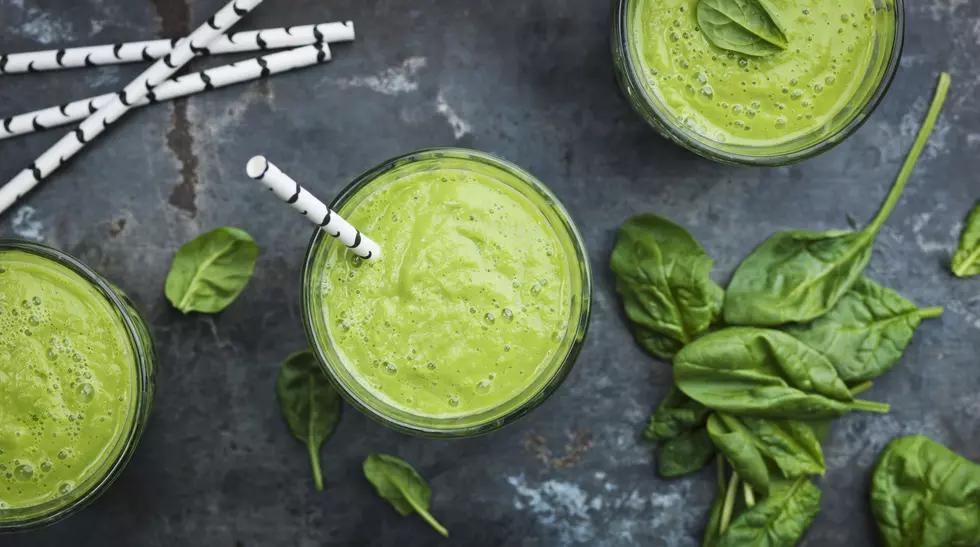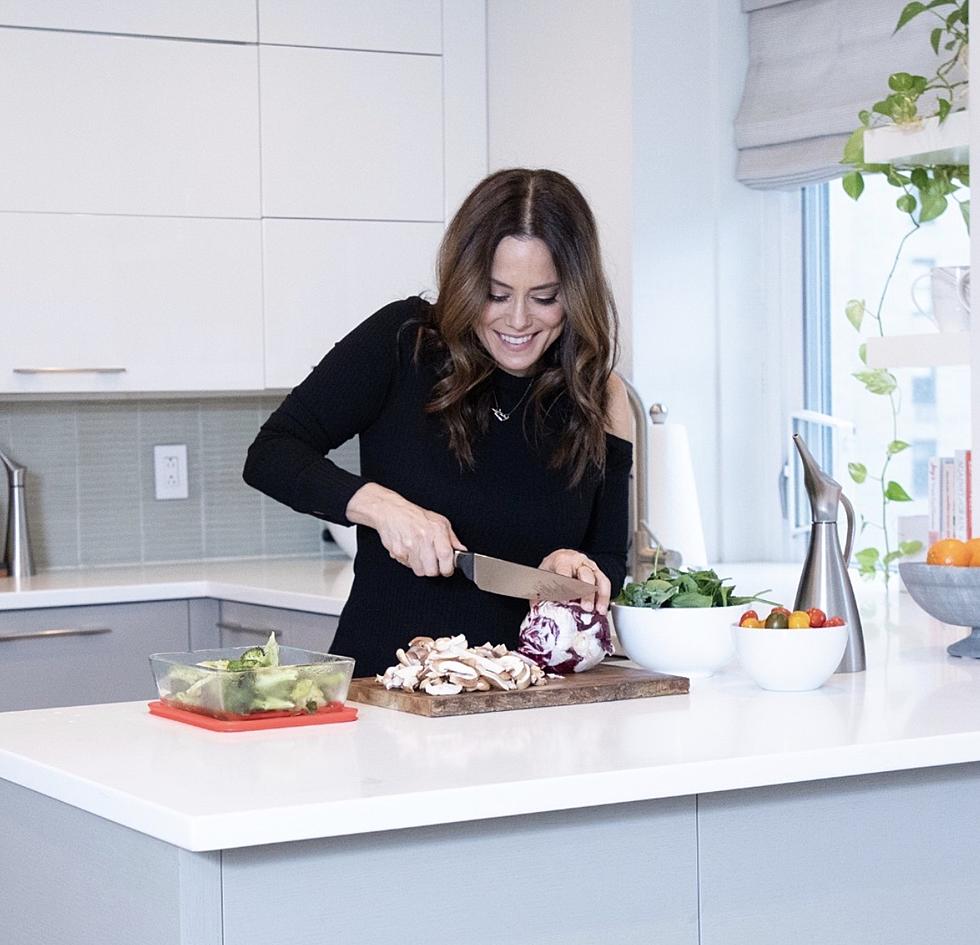
Eat These Plant-Based Foods to Get Rid of Bloating
That tight, stuffed, extended feeling in your lower abdomen that makes it feel like you've swallowed a balloon? That’s bloating, and it has likely happened to all of us at some point in time since one study found that 19 percent of people say they've experienced bloating on a regular basis.
But what causes bloating and how can we eat to alleviate it or avoid it altogether? There are foods that help fight bloat and others that contribute to it. Here's what science tells us about bloating and its relationship to diet.
Technically bloating happens when air or gas gets into our gastrointestinal tract (the entirety of our digestive system from our mouth all the way down to our rectum), and it can create a feeling of fullness that is uncomfortable and may actually cause our stomach to expand.
While some of us may be more prone to bloating than others, there is a reason behind it and useful tips to get rid of it, beyond just pulling on our stretchy pants and waiting it out.
What Causes Bloating?
One of the main causes of bloating is an accumulation of gas, typically after we eat. This gas occurs due to several reasons, including eating too fast and swallowing air.
According to the International Foundation for Gastrointestinal Disorders, swallowed air can occur for many reasons including:
- Postnasal drip
- Smoking
- Eating too quickly
- Chewing gum or sucking on hard candy
- Dentures that don’t fit properly
Foods that Cause Gas
Some foods cause you to experience bloating or gas more than others. Most of the time it’s carbohydrate-rich foods since protein and fat are less gas-forming. Even complex carbohydrates –– which are generally healthy –– can cause bloat in some people. First of all, they are harder for your body to break down due to the type of sugars and other compounds they contain. And in some cases, you may have a sensitivity to one or more of these starches that naturally occur in whole foods. These include:
- Raffinose, lactose, fructose, and sorbitol (all naturally occurring sugars)
- Starches (except rice)
- Fiber, which is actually healthy and should not be avoided
The reason behind these gas-forming compounds is that we are either lacking the enzyme to break them down or in the case of insoluble fibers, we can’t break them down at all.
For example, lactose (found in dairy products) requires an enzyme called lactase to fully digest. Individuals who are lactose intolerant don’t create enough of this enzyme, leading to gastrointestinal discomfort whenever they eat foods that contain lactose, such as milk, cheese, ice cream, or foods that contain dairy.
In another example, high-fiber foods such as celery or cruciferous vegetables go through our digestive system intact, which is normal, and healthy, but in the gut, our bacteria try to break it down, which leads to it fermenting and forming gas – since our body's healthy gut bacteria like to feed on this type of fiber.
Foods that Cause Bloating
The following foods are the most likely to cause gas according to the International Foundation for Gastrointestinal Disorders.
- Beans (including chickpeas and all legumes)
- Certain Veggies that include artichokes, asparagus, broccoli, cabbage, Brussels sprouts, cauliflower, and onion
- Fruits such as apples, pears, peaches, bananas, prune, and apricots
- Whole grains and bran
- Carbonated beverages
- Milk and dairy products
- Foods that contain sorbitol (a type of sugar alcohol)
How to Stop Bloating
Completely avoiding all gas-forming foods is not the way to go, since these foods also contain important nutrients including vitamins, minerals, and phytochemicals that are beneficial for immunity, gut health, and disease prevention. Instead, it's best to pinpoint a specific food (or group) that may be causing your bloat, and eliminate those items one at a time to see if it helps.
Other Causes of Bloating
According to John Hopkins Medicine, you could have a condition that makes you more susceptible to bloating, and if your bloating is frequent, painful, or disruptive to your everyday activities you'll want to see a doctor who can figure out if you might have Irritable Bowel Syndrome or a food allergy or auto-immune condition. Bloating is also caused by:
- Constipation
- Gluten intolerance or Celiac Disease
- Gastroparesis (delayed emptying of the stomach)
- Small intestinal bacterial overgrowth (SIBO)
Bloating and the Low-FODMAP Diet
You don’t have to learn to live with constant bloating, but it will take some effort on your end to prevent it. According to the International Foundation for Gastrointestinal Disorders, bloating can be prevented by changing your diet and following a Low FODMAP Diet
When it comes to diet change, one good way to pinpoint what foods are making you bloat is to try the FODMAP diet. FODMAP stands for Fermentable Oligosaccharides, Disaccharides, Monosaccharides, and Polyols. John Hopkins Medicine states that these are all short-chain sugars that our small intestine often can’t absorb properly, leading to digestive distress such as gas and bloating.
FODMAPs can ferment inside your gut, and draw water into your digestive tract, causing bloating. Not everyone is sensitive to FODMAPs, but if you experience constant bloating, it could be a sign to avoid high-FODMAP foods.
3 Steps to Fight Bloating
- Stop eating high-FODMAP foods for approximately 2 to 6 weeks
- Slowly reintroduce them one by one, to see which bothers you the most
- Avoid the foods that you are sensitive to. Once you figure out which foods are problematic, you can avoid them
Avoid These High-FODMAP Foods
- Honey
- Milk or other dairy products
- Garlic
- Onions
- Cauliflower
- Mushrooms
- Artichokes
- Avocados
- Apricots and other pitted fruits
- Apples
- Wheat
- Cashews
- Pistachios
- Beans
- Dried fruits
Foods That Reduce Bloating
To improve or get rid of bloating, eat a low FODMAP diet of:
- Almond milk
- Whole Grains such as rice, quinoa, and oats
- Certain Vegetables
- Citrus Fruits: oranges, kiwis, pineapple
- Bananas
- Blueberries
- Carrots
- Cucumbers
- Grapes
- Bell peppers
- Potatoes
- Tomatoes
- Spinach
- Eggplant
- Zucchini
You’re bloating could also be coming from the fact that you went from eating a low-fiber diet to adding too many high-fiber foods all at once. Such as when you swear off your usual junk food habit and start eating salads and grain bowls all of a sudden.
While fiber is a beneficial nutrient, it should be gradually increased in your diet, so that your gut microbiome can shift over to produce more healthy bacteria to help break down the fiber. Once you can comfortably tolerate 25 grams of fiber per day –the recommended amount for women –– or the 38 grams per day –– recommended for men – you'll feel better and less hungry, and be healthier and have more energy all day long.
In order to limit the amount of air you swallow, make sure that you’re eating your meals slowly and avoid gulping down food, chewing gum, or making a habit of sucking on hard candies.
When Bloating Indicates Something More Serious
Don’t take bloating with a grain of salt. Sometimes it can indicate a serious underlying health problem. According to GI Associates & Endoscopy Center, you should go see your doctor ASAP if you have any of the following symptoms, along with persistent bloating:
- Bloody stools or vaginal bleeding: This could indicate ovarian cancer. Rush University states that persistent bloating and a “full” feeling are some of the early signs of ovarian cancer that go undetected because women don't know what to look for.
- Diverticulitis: This is when pouches in the lining of your intestines become infected or inflamed. This can lead to bloating, abdominal pain, and fever. You'll need to get antibiotics as soon as possible to keep the infection from spreading so call your doc.
- Ascites: This is when fluid builds up in the abdomen. Typically, this indicates liver disease, but if bloating is paired with jaundice (yellowing of the skin) it could also indicate liver cancer. If you ever have yellowing of the skin call your doctor.
- Fever: whenever you’re dealing with a fever, especially when it includes other symptoms such as bloating, it usually means there is inflammation or an infection happening somewhere in the body. Your doctor will need to take your blood to help her pinpoint exactly what may be going on.
Bottom Line: Treat Bloating By Eating a Low-FODMAP Diet
In order to prevent bloating, you will likely need to adjust your diet, cut out dairy and try going on the low-FODMAP diet. Then, add back in fiber foods one at a time to see if a specific food is causing bloating. If you incorporate these tips to prevent bloating, and it still persists or gets worse, make an appointment to see your doctor.
The 13 Best Foods to Boost Your Immune System to Fight Off COVID-19 Symptoms
More From The Beet









